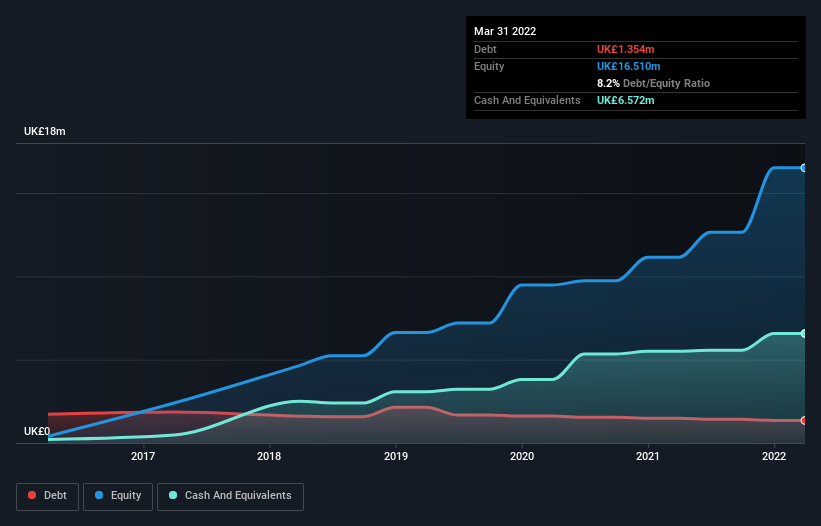Cake Box Holdings (LON:CBOX) Has A Rock Solid Balance Sheet
Some say volatility, rather than debt, is the best way to think about risk as an investor, but Warren Buffett famously said that 'Volatility is far from synonymous with risk.' So it might be obvious that you need to consider debt, when you think about how risky any given stock is, because too much debt can sink a company. As with many other companies Cake Box Holdings Plc (LON:CBOX) makes use of debt. But should shareholders be worried about its use of debt?
Why Does Debt Bring Risk?
Generally speaking, debt only becomes a real problem when a company can't easily pay it off, either by raising capital or with its own cash flow. Part and parcel of capitalism is the process of 'creative destruction' where failed businesses are mercilessly liquidated by their bankers. However, a more common (but still painful) scenario is that it has to raise new equity capital at a low price, thus permanently diluting shareholders. Of course, the upside of debt is that it often represents cheap capital, especially when it replaces dilution in a company with the ability to reinvest at high rates of return. When we examine debt levels, we first consider both cash and debt levels, together.
Check out our latest analysis for Cake Box Holdings
How Much Debt Does Cake Box Holdings Carry?
The image below, which you can click on for greater detail, shows that Cake Box Holdings had debt of UK£1.35m at the end of March 2022, a reduction from UK£1.49m over a year. However, its balance sheet shows it holds UK£6.57m in cash, so it actually has UK£5.22m net cash.
How Healthy Is Cake Box Holdings' Balance Sheet?
The latest balance sheet data shows that Cake Box Holdings had liabilities of UK£4.17m due within a year, and liabilities of UK£4.88m falling due after that. Offsetting these obligations, it had cash of UK£6.57m as well as receivables valued at UK£2.64m due within 12 months. So its total liabilities are just about perfectly matched by its shorter-term, liquid assets.
Having regard to Cake Box Holdings' size, it seems that its liquid assets are well balanced with its total liabilities. So while it's hard to imagine that the UK£78.0m company is struggling for cash, we still think it's worth monitoring its balance sheet. Simply put, the fact that Cake Box Holdings has more cash than debt is arguably a good indication that it can manage its debt safely.
On top of that, Cake Box Holdings grew its EBIT by 49% over the last twelve months, and that growth will make it easier to handle its debt. There's no doubt that we learn most about debt from the balance sheet. But it is future earnings, more than anything, that will determine Cake Box Holdings's ability to maintain a healthy balance sheet going forward. So if you're focused on the future you can check out this free report showing analyst profit forecasts.
Finally, a business needs free cash flow to pay off debt; accounting profits just don't cut it. While Cake Box Holdings has net cash on its balance sheet, it's still worth taking a look at its ability to convert earnings before interest and tax (EBIT) to free cash flow, to help us understand how quickly it is building (or eroding) that cash balance. Over the most recent three years, Cake Box Holdings recorded free cash flow worth 69% of its EBIT, which is around normal, given free cash flow excludes interest and tax. This free cash flow puts the company in a good position to pay down debt, when appropriate.
Summing up
While we empathize with investors who find debt concerning, you should keep in mind that Cake Box Holdings has net cash of UK£5.22m, as well as more liquid assets than liabilities. And it impressed us with its EBIT growth of 49% over the last year. So we don't think Cake Box Holdings's use of debt is risky. There's no doubt that we learn most about debt from the balance sheet. But ultimately, every company can contain risks that exist outside of the balance sheet. For example, we've discovered 3 warning signs for Cake Box Holdings (1 is potentially serious!) that you should be aware of before investing here.
At the end of the day, it's often better to focus on companies that are free from net debt. You can access our special list of such companies (all with a track record of profit growth). It's free.
Have feedback on this article? Concerned about the content? Get in touch with us directly. Alternatively, email editorial-team (at) simplywallst.com.
This article by Simply Wall St is general in nature. We provide commentary based on historical data and analyst forecasts only using an unbiased methodology and our articles are not intended to be financial advice. It does not constitute a recommendation to buy or sell any stock, and does not take account of your objectives, or your financial situation. We aim to bring you long-term focused analysis driven by fundamental data. Note that our analysis may not factor in the latest price-sensitive company announcements or qualitative material. Simply Wall St has no position in any stocks mentioned.
Join A Paid User Research Session
You’ll receive a US$30 Amazon Gift card for 1 hour of your time while helping us build better investing tools for the individual investors like yourself. Sign up here

 Yahoo Finance
Yahoo Finance 
